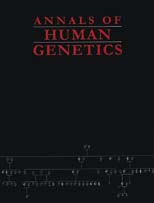Article contents
Genetic analysis of a Japanese patient with butyrylcholinesterase deficiency
Published online by Cambridge University Press: 01 November 1997
Abstract
A patient (64-year-old, male) with familial cholinesterasemia caused by BChE deficiency was studied. DNA sequence analysis of all exons identified a point mutation, an A→G transition at codon 128, resulting in a Tyr→Cys substitution. The propositus showed extremely low BChE activity, but his other family members (three individuals) showed from intermediate to normal BChE activity. An immunological method revealed the absence of BChE protein in serum of the propositus. Both PCR primer introduced restriction analysis (PCR-PIRA) and sequence analysis revealed all three family members to be heterozygotes for this mutation.
- Type
- Research Article
- Information
- Copyright
- © University College London 1997
- 7
- Cited by


